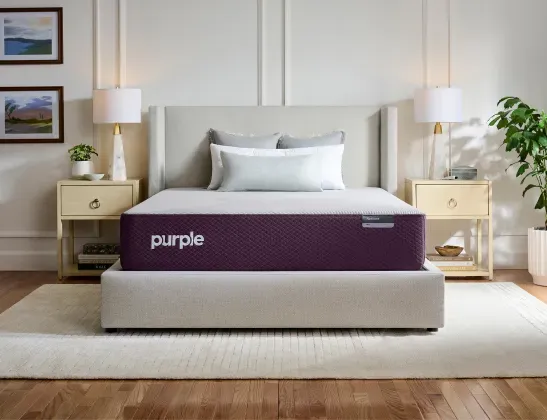Parent Sleep Deprivation: What to Expect & How to Fix
Thu Apr 24 2025
- Sleep Tips
- Lifestyle
If you’re reading this at 3 a.m. while bouncing a baby on one hip and Googling “how much sleep do new parents get,” you’re in the right place. The bleary-eyed club of sleep-deprived parents. It’s tough, it’s real, and you’re absolutely not alone.
Sleep deprivation hits hard. But there’s hope (and a few tricks) to make the fog a little lighter. Let’s break down what you can expect and how a mattress upgrade can help.

What Sleep Looks Like in the First Year
Studies show that new parents face up to six years of sleep deprivation, with the worst of it occurring three months after birth.
So if you feel like you haven’t slept since your baby was born, you're not imagining it.
In those first few months, you’re likely sleeping in 2–3 hour stretches (if that). Your brain’s foggy, your emotions are swinging, and your body is just trying to keep up with being sleep bankrupt. As your baby gets older, things typically improve, but it’s not always linear.
Here’s what most parents experience month by month:
-
Month 1–3: Total survival mode. You're sleeping in shifts. Night feedings feel endless.
-
Month 4–6: Sleep patterns begin to shift, but “sleep regressions” may show up just to keep things interesting.
-
Month 7–12: Some babies start sleeping through the night. Others? Not so much. And teething, growth spurts, and separation anxiety don’t help.

Why New Parents Are So Tired
Sure, babies wake up a lot. But that’s not the only thing draining you. Here's what else is happening:
-
You’re always “on” even when you’re technically resting.
-
Hormones fluctuate during postpartum, including cortisol and adrenaline.
-
You’re adjusting to a new identity and trying to learn as you go.
-
You probably haven’t had a full REM cycle in weeks.
How to Cope With Sleep Deprivation as a Parent
You're not going to get a solid eight hours every night for a while, but you can protect your energy and sanity. Here's how:
1. Lower Your Workload
The dishes can wait. The laundry can pile up. Your only job right now is keeping your baby (and yourself) happy and fed.
2. Work Together
If you have a partner, tag team the night shifts. Even alternating nights can make a huge difference. Alternatively, ask a friend or family member to hold the baby for an hour while you nap. (If you're doing this completely solo, you're a rockstar.)
3. Create a Rest-Friendly Sleep Space
Your baby isn’t the only one who deserves a comfy setup. If your mattress feels more like a slab of concrete these days, it might be time for a refresh. A soft mattress for pressure relief can help your body recover from all those weird sleep positions.
4. Use Sleep “Snacks”
Even 20-minute naps can reset your brain. Don’t chase long stretches if they’re not realistic—grab small pockets of rest whenever you can.
5. Limit Scrolling at Night
The 2 a.m. doom scroll doesn’t help. Keep your room dark, your phone dimmed or away, and use a white noise machine to cue rest (for both you and baby).

Top Mattresses to Help With Sleep Deprivation
Beautyrest Black Series One Mattress
Model: 7008121511050
-
Breathable design to help with postpartum night sweats
-
Premium Pocketed Coil Technology for individualized support and motion separation
-
Contouring foam adheres to the shape of your body
→ Shop Beautyrest mattresses
Tempur-Pedic TEMPUR-Adapt® Mattress
Model: 10745151
-
Adapts to your shape and supports tired joints
-
Excellent motion isolation
-
Cooling tech helps regulate temperature
→ Explore Tempur-Pedic mattresses
Purple Restore Mattress
Model: 102123987
-
Responsive hybrid mattress with pressure relief and temperature balancing
-
GelFlex Grid technology gently cradles the body and alleviates discomfort
-
Made with Non-toxic materials and comes with an antimicrobial cover
→ Discover Purple mattresses

When Does Sleep Deprivation Get Better?
Here’s the good news: it does get better! For many parents, things start to shift around the 6-month mark, with bigger improvements by the time your baby turns 1. Then you’ll be able to shift your focus toward transitioning your child to a big kid bed.
That said, postpartum fatigue can linger, and insomnia is real, especially if you’re anxious or overstimulated. If sleep feels impossible long after your baby starts sleeping through the night, it might be worth talking to your doctor.

Upgrade Your Sleep at Bedzzz Express
Parent sleep deprivation is brutal, but it’s also temporary. Don’t underestimate the power of a supportive mattress, a consistent bedtime routine, and saying yes to help.
At Bedzzz Express, we know how precious rest is, especially during those early parenting days. Visit one of our mattress store locations in Alabama or Georgia, or contact us to find a new mattress. Check out our top mattress brands for more options.
With our 3-year exchange policy and 2-year extended warranty, you can shop with confidence, knowing you're covered long after your purchase. We also offer other bedding accessories, like mattress toppers and pillows, to enhance your sleep experience further.
Shop mattresses at Bedzzz Express today!
Related readings from our blog:
FAQ: Common Questions About Parent Sleep Deprivation
1. How much sleep do new parents get?
Most new parents get around 4–6 hours per night in broken stretches, especially in the first 3–6 months.
2. How long does sleep deprivation last for new parents?
Sleep starts improving around 6 months for many, but it varies. Some babies wake at night well into toddlerhood.
3. How can I cope with sleep deprivation as a new parent?
Prioritize rest over chores, nap when you can, lean on support systems, and invest in a mattress that promotes deep rest.
4. Why can’t I sleep even when my baby is sleeping?
Hormonal shifts, stress, and overstimulation can lead to postpartum insomnia. Try winding down with dim lights, no screens, and relaxing routines.
5. How long does postpartum fatigue last?
It can last weeks to months, depending on your body, mental health, and sleep. If it feels extreme or doesn’t improve, check in with your doctor.
Related Articles
.svg)